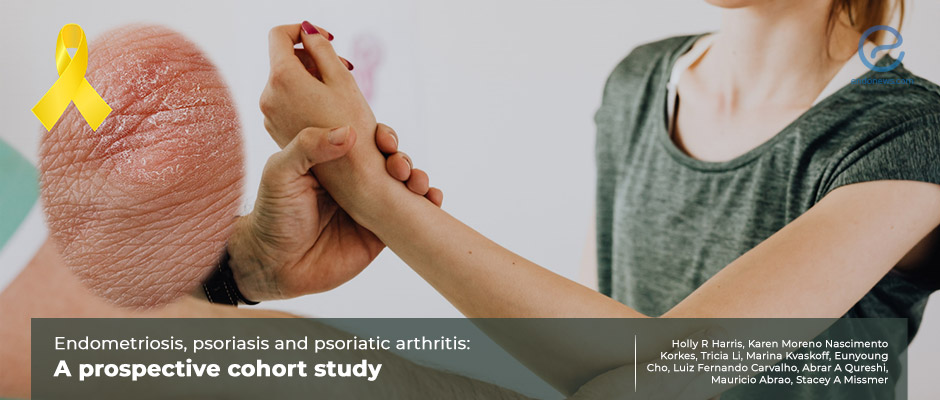Association of psoriasis and endometriosis
Feb 25, 2022
Psoriasis with concomitant psoriatic arthritis is associated with a higher risk of developing endometriosis later.
Key Points
Importance:
- Endometriosis, as a chronic inflammatory disease, has been shown to be associated with other immune-mediated inflammatory disorders.
Highlights:
- Women with psoriasis and psoriatic arthritis have a 2 fold high risk of developing subsequent endometriosis.
- On the contrary, women diagnosed with endometriosis did not show any association to develop the psoriatic disease later.
What's done here:
- This is an extraction from an ongoing cohort (Nurses Health Study II), on patients with laparoscopically confirmed endometriosis, and physician-diagnosed psoriasis- psoriatic arthritis for over 22 years of follow-up.
- Over 88 thousand participants, with more than 4.000 incident cases of endometriosis, 767 psoriasis cases, 140 of whom had psoriatic arthritis were detected.
- On the other hand, over 91 thousand patients were followed up, and 697 cases of psoriasis (110 with psoriatic arthritis) were evaluated for the development of subsequent endometriosis.
- Statistical methods were used to assess the bi-directional association between endometriosis and psoriasis and psoriatic arthritis.
Key results:
- Only a history of psoriasis is NOT associated with endometriosis risk, but a history of psoriasis with psoriatic arthritis is associated with a 2-fold higher risk of endometriosis in this group.
- The diagnosis of endometriosis occurred at a median of 6,5 years after the diagnosis of psoriasis.
- When the endometriosis patients were evaluated for psoriasis risk, no association was observed for subsequent psoriasis.
- The participants diagnosed with psoriasis and psoriatic arthritis had higher mean BMI, less physical activity, and more analgesic users who experienced more infertility.
Lay Summary
Psoriasis is an immune-mediated inflammatory skin disease characterized by scalpy, red, and well-demarcated skin plaques that are observed in 2-4% of the population. Approximately 30% of psoriatic patients additionally have joint pain, stiffness, and swelling called psoriatic arthritis. The mechanism for the chronic inflammatory nature of endometriosis and psoriasis, are both poorly understood.
Harris et al. from the University of Washington, Seattle, USA planned this prospective cohort study to measure the bi-directional relationship between endometriosis and psoriasis with psoriatic arthritis. Nurses Health Study II consisted of 116,429 female registered nurses who completed a baseline questionnaire about their health and lifestyle starting from 1989 and later transformed into a prospective study with follow-ups until 2013. Over 88 thousand patients, among 4112 laparoscopically-confirmed endometriosis patients, 767 physician-diagnosed psoriasis (140 of whom with psoriatic arthritis) were detected. On the other hand, over 91.000 patients, where 697 cases of physicians-reported psoriasis (110 cases of psoriasis with psoriatic arthritis) the development of endometriosis was examined.
The authors found that only a history of psoriasis is not associated with endometriosis risk, but a history of psoriasis with psoriatic arthritis is associated with a 2-fold higher risk of endometriosis in this group. On the other hand, the risk of psoriasis is not different in patients with endometriosis.
This long-term study was recently published in the American Journal of Epidemiology addresses a new perspective in the field.
Research Source: https://pubmed.ncbi.nlm.nih.gov/35029650/
psoriasis psoriatic arthritis inflammatory disorderds biennial questionnaire CRP pro-inflammatory cytokines endometriosis.

